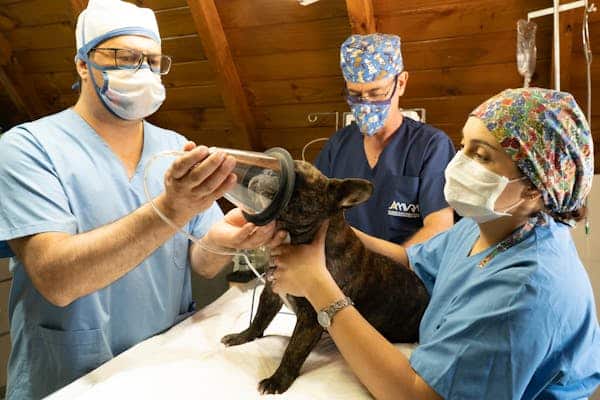Pursuing a career as a veterinary technician is an exciting opportunity for animal lovers who want to make a difference in pet care. Online vet tech programs provide a practical, flexible way to earn the credentials needed to work in veterinary clinics, animal shelters, or zoos. These programs combine the convenience of online learning with hands-on training, making them ideal for busy individuals or those living far from traditional schools. It dives into the details of online vet tech programs, exploring their structure, benefits, and how to choose the right one for your career goals. With a growing demand for skilled veterinary technicians, now is a great time to explore this rewarding path.
Why Choose an Online Vet Tech Program?
Online vet tech programs offer a unique blend of flexibility and quality education. These programs allow students to study from anywhere with an internet connection, making them perfect for those with demanding schedules or limited access to campus-based schools. Whether you’re a working professional, a parent, or someone in a rural area, online learning lets you balance education with life’s responsibilities. Programs like those offered by San Juan College and Penn Foster provide asynchronous coursework, meaning you can complete assignments and watch lectures at your convenience without attending live classes.
Accreditation Matters
A key factor in choosing an online vet tech program is accreditation. The American Veterinary Medical Association (AVMA) Committee on Veterinary Technician Education and Activities (CVTEA) sets the standard for quality veterinary technology education. Accredited programs ensure you receive the training needed to pass the Veterinary Technician National Exam (VTNE), a requirement for licensure in most states. Schools like Purdue University, San Juan College, and Penn Foster hold AVMA-CVTEA accreditation, guaranteeing that their curriculum meets industry standards and prepares you for a successful career.
Meeting Industry Demand
The veterinary field is growing rapidly, with the Bureau of Labor Statistics projecting a 20% increase in veterinary technician jobs from 2021 to 2031. This growth is driven by rising pet ownership and advancements in veterinary medicine, creating a strong demand for skilled professionals. Online vet tech programs equip students with the knowledge and skills to thrive in this expanding field, opening doors to jobs in veterinary clinics, animal hospitals, and even research facilities.
What to Expect from Online Vet Tech Programs
Online vet tech programs are designed to provide comprehensive training through a mix of virtual coursework and practical experience. Most programs lead to an Associate of Applied Science (AAS) degree, which typically takes two to three years to complete. Students study topics like animal anatomy, pharmacology, and diagnostic imaging, gaining the foundational knowledge needed to assist veterinarians in clinical settings.
Core Curriculum
The coursework in online vet tech programs covers essential topics to prepare students for real-world veterinary work. You’ll learn about animal anatomy and physiology to understand how animals’ bodies function. Veterinary pharmacology courses teach you about medications and their applications in animal care. Diagnostic imaging classes focus on techniques like X-rays and ultrasounds, while surgical and clinical procedure training prepares you to assist during operations. These courses require about five to seven hours of study per week per course, depending on the program’s pace.
Hands-On Clinical Experience
While coursework is completed online, hands-on training is a critical component of vet tech programs. Students work at local veterinary clinics or hospitals under the supervision of licensed veterinarians or credentialed vet techs. For example, Penn Foster includes two clinical externships where students practice skills like taking vital signs and preparing animals for surgery. San Juan College offers a Fast Track Lab in Waco, Texas, for large animal skills, though students can also complete clinical hours locally. Purdue University requires 240 hours of practical training, often documented through videos to ensure students master key skills.
Preparing for the VTNE
Passing the Veterinary Technician National Exam (VTNE) is a crucial step toward licensure. Accredited online programs are designed to prepare students for this exam through targeted coursework and practice tests. San Juan College boasts VTNE pass rates 15-20% above the national average, while Penn Foster reports a 72.17% pass rate, slightly above the national 70%. Purdue University’s program achieves an impressive 90% pass rate, reflecting its rigorous preparation. This focus on exam readiness ensures graduates are well-equipped to enter the workforce.
Top Online Vet Tech Programs
Several schools offer high-quality, AVMA-accredited online vet tech programs, each with unique strengths. San Juan College provides a fully online Associate of Applied Science in Veterinary Technology, with flexible start dates in fall, spring, or summer. The program includes a two-day lab in Texas for large animal training, making it accessible for students worldwide. Penn Foster College offers a self-paced associate degree with two clinical externships, partnering with major veterinary hospitals like Banfield and VCA for hands-on experience. Purdue University’s Veterinary Nursing Distance Learning program combines a science-based curriculum with optional workshops and a high VTNE pass rate. St. Petersburg College delivers an Associate of Science in Veterinary Technology with 280 clinical hours per semester, accredited by both AVMA and the American Animal Hospital Association.
Benefits of Online Vet Tech Training
Choosing an online vet tech program comes with several advantages. These programs are often more affordable than on-campus options, as students save on commuting, housing, and campus fees. The flexibility of online learning allows you to study from anywhere, making it easier to fit education into a busy life. Hands-on externships ensure you gain practical experience, preparing you for roles in veterinary clinics, shelters, or zoos. With the veterinary field’s strong job growth, graduates are well-positioned to secure rewarding careers.
Challenges to Keep in Mind
Online vet tech programs require self-discipline and strong time management skills. Without set class times, students must stay motivated to complete assignments on schedule. Feedback from instructors may not be immediate, and networking opportunities can be limited compared to in-person programs. Securing a local veterinary clinic for clinical hours is also essential, as programs rely on students finding suitable facilities. Choosing an accredited program and planning ahead for clinical requirements can help overcome these challenges.
How to Select the Right Program
Selecting the right online vet tech program requires careful consideration. First, ensure the program is AVMA-CVTEA accredited to guarantee eligibility for the VTNE. Check if you can arrange clinical hours at a local veterinary facility, as this is a key requirement. Review the program’s VTNE pass rates to gauge its effectiveness—Purdue and San Juan College, for example, have strong track records. Compare tuition costs and explore financial aid options, such as scholarships or payment plans offered by San Juan College. Finally, look for programs with robust support services, like academic advising and career guidance, to help you succeed.
Steps to Becoming a Licensed Vet Tech
Becoming a licensed veterinary technician involves several steps. Start by earning a high school diploma or GED, ideally with a focus on science courses like biology or chemistry. Next, enroll in an AVMA-accredited vet tech program, either online or on-campus. Complete the required clinical hours at a veterinary facility to gain practical experience. After finishing your degree, register for and pass the VTNE. Finally, apply for licensure through your state’s veterinary board, submitting your transcripts and VTNE scores. Licensing requirements vary by state, so check with your local board for specific details.
Conclusion
Online vet tech programs offer a flexible, accredited pathway to a fulfilling career in animal care. With programs from schools like San Juan College, Penn Foster, Purdue University, and St. Petersburg College, students can gain the skills needed to pass the VTNE and secure licensure. The combination of online coursework and hands-on training prepares graduates for the growing demand in the veterinary field. By choosing a program that fits your needs and committing to the training process, you can build a rewarding career helping animals and their owners.







